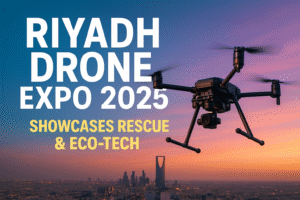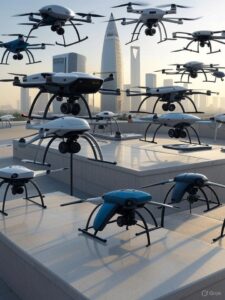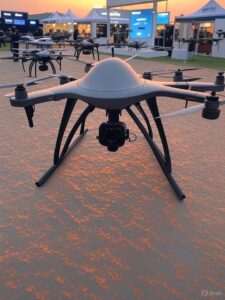The Saudi capital recently hosted one of the most anticipated technology events of the year. The Saudi Drone Exhibition at the Riyadh Front Exhibition and Conference Center. The three-day expo, themed “Drones and the Future of Integrated Transformation,” brought together global leaders, innovators, and experts to showcase how drones reshape industries such as emergency response, environmental protection, transportation, and logistics.

Organized with the participation of more than 100 local and international entities, the exhibition highlighted how Saudi Arabia is positioning itself as a global hub for advanced technologies in line with its Vision 2030 goals. From life-saving rescue drones to artificial intelligence-powered monitoring systems, the event emphasized how unmanned aerial vehicles are becoming an essential part of the Kingdom’s modernization strategy.
Civil Defense Showcases Next-Generation Rescue Drones:
A major highlight of the exhibition was the participation of the General Directorate of Civil Defense, which unveiled several advanced drone solutions designed to improve public safety and emergency response.
Civil Defense officials presented drones capable of detecting hazardous, radioactive, and chemical materials, providing a vital tool for identifying threats in disaster-prone or high-risk environments. These technologies are crucial for protecting first responders who often put their lives at risk when dealing with dangerous substances.
Additionally, the Civil Defense demonstrated drones built for search-and-rescue missions in areas difficult to access, such as rugged mountain terrains and flood-affected zones. With the Kingdom experiencing seasonal flash floods and expanding urban areas, these drones offer fast and efficient ways to locate and assist stranded individuals.

Another breakthrough showcased was the Falcon Drone, specifically designed for firefighting operations in high-altitude or hazardous areas. Equipped with specialized extinguishing mechanisms, the drone can support firefighting teams in locations where traditional vehicles or helicopters face limitations. This innovation reflects the growing reliance on aerial technology to enhance safety and reduce risks for human responders.
Environmental Security Forces Highlight Sustainability Tools:
The Special Forces for Environmental Security (SFES) also made a strong impact at the exhibition by showcasing advanced drones and artificial intelligence-powered systems aimed at environmental monitoring and resource protection.
Their display included drones fitted with AI-based thermal imaging cameras capable of detecting illegal hunting activities, monitoring wildlife habitats, and preventing deforestation. These tools are also being applied to track changes in natural reserves, helping ensure the Kingdom’s biodiversity is preserved.
In addition, the SFES demonstrated how drones are used to combat environmental crimes such as overfishing, illegal grazing, and the misuse of water resources. By integrating real-time data collection with AI analytics, authorities can respond more effectively to threats against ecosystems.
The participation of SFES underscored Saudi Arabia’s broader commitment to environmental sustainability. Protecting natural resources is a key part of the country’s Vision 2030 goals, and drone technology is becoming an important ally in balancing development with ecological conservation.
Expanding Drone Applications Across Multiple Industries:
The Riyadh Drone Expo was not only about emergency response and environmental monitoring. It also served as a platform to showcase how drones are transforming a wide range of industries.

Key sectors highlighted during the event included:
-
Transportation and Logistics: Drones are being developed for cargo delivery and last-mile logistics, offering solutions to enhance supply chain efficiency and reduce carbon emissions.
-
Agriculture: Precision agriculture drones can analyze soil conditions, monitor crop health, and optimize irrigation, helping farmers increase productivity while conserving resources.
-
Oil and Gas: Drones are being deployed for pipeline inspections, offshore platform monitoring, and leak detection, improving safety and reducing operational costs.
-
Environmental Management: From waste tracking to pollution monitoring, drones provide real-time insights that help authorities manage urban and rural environments more effectively.
-
Public Safety and Surveillance: Security agencies are integrating drones for crowd management, border control, and surveillance during major events, ensuring both safety and efficiency.
This diversity in applications demonstrates that drones are no longer niche tools — they are now central to the digital transformation of industries worldwide.
Strategic Sponsorship by the General Authority of Civil Aviation:
The General Authority of Civil Aviation (GACA) played a central role as the event’s strategic sponsor. Its involvement reflects Saudi Arabia’s ambition to build a strong regulatory and infrastructural framework for drone integration in both civil and commercial aviation.
According to GACA officials, supporting drone innovations aligns with the Kingdom’s vision to become a global logistics hub. By modernizing air transport infrastructure and promoting sustainable aviation technologies, Saudi Arabia is opening doors for drone operators, investors, and startups to thrive.
The sponsorship also highlights GACA’s commitment to sustainability in aviation, with a focus on reducing environmental impact while expanding drone-enabled services. This direction is consistent with global aviation trends that are increasingly prioritizing eco-friendly solutions.
International Collaboration and Investment Opportunities:
One of the most valuable aspects of the exhibition was the opportunity for international collaboration. Industry leaders, investors, government officials, and technology companies from around the world gathered to exchange ideas and explore partnerships.
Saudi Arabia is actively encouraging foreign investment in drone technologies, offering incentives and creating business-friendly environments for startups and global enterprises. The expo served as a platform for showcasing the Kingdom’s readiness to adopt innovative solutions and become a testbed for new technologies.
Experts at the event emphasized that Saudi Arabia’s unique geography — with vast deserts, coastlines, and urban growth — provides an ideal environment for developing drone-based solutions that can later be exported to other regions.
Positioning Riyadh as a Regional Tech Hub:
The success of the Saudi Drone Exhibition highlights Riyadh’s growing role as a regional center for technology and innovation. By hosting events of this scale, the capital is sending a clear message: it is ready to lead the Middle East in the integration of emerging technologies.
From smart mobility to AI-powered environmental protection, the event reflected Saudi Arabia’s broader ambition to diversify its economy and build industries beyond oil. The Kingdom’s proactive approach to adopting cutting-edge technologies places it among global leaders shaping the future of drone applications.
Conclusion:
The Riyadh Drone Expo 2025 showcased more than just the latest aerial technologies — it reflected the Kingdom’s vision of building a modern, secure, and sustainable future. With groundbreaking innovations in emergency response, environmental monitoring, logistics, and aviation, the exhibition demonstrated how drones are becoming indispensable tools for solving real-world challenges.
By bringing together experts, companies, and policymakers, the event provided a platform for collaboration and knowledge exchange, setting the stage for Saudi Arabia to emerge as a global leader in drone innovation.
As drones continue to evolve, their role in safety, sustainability, and economic growth will only expand, and Riyadh’s position as a hub for drone technology will remain central to the Kingdom’s transformation journey.



0 Comments